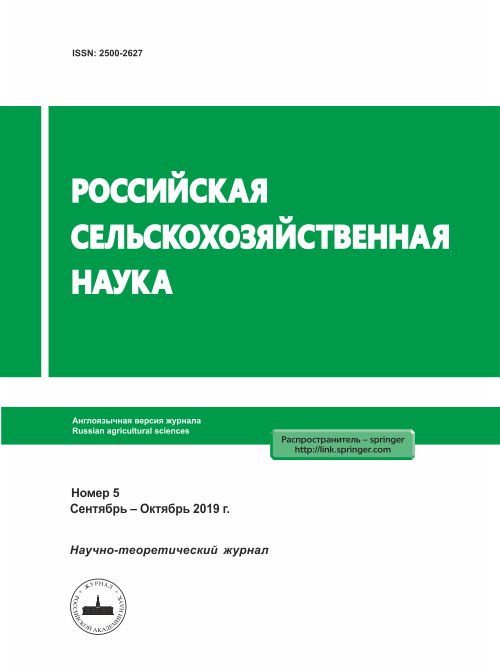Вегетационный период и урожайность пленчатого овса
- Авторы: Кротова Н.В.1, Баталова Г.А.1, Changzhong R.2, Журавлева Г.П.1
-
Учреждения:
- Федеральный аграрный научный центр Северо-Востока имени Н.В. Рудницкого
- Байченская академия сельскохозяйственных наук
- Выпуск: № 5 (2019)
- Страницы: 7-10
- Раздел: Растениеводство
- URL: https://journals.eco-vector.com/2500-2627/article/view/16519
- DOI: https://doi.org/10.31857/S2500-2627201957-10
- ID: 16519
Цитировать
Полный текст
Аннотация
В 2016-2018 гг. в условиях Волго-Вятского региона, характеризующегося коротким прохладным вегетационным периодом с нестабильным режимом увлажнения, изучены 136 сортообразцов овса пленчатого по продолжительности периода вегетации и урожайности с целью уточнения их классификации по скороспелости, выделения источников для использования в селекции на адаптивность. По скороспелости определены группы генотипов: ранние – период вегетации 65-80 дней, среднеспелые – 74-88 дней, среднепоздние – 79-93 дня, позднеспелые – 80-103 дня. Установлено, что продолжительность периода всходы – восковая спелость в выделенных группах генотипов стабильна, коэффициенты корреляции в парах между 2016, 2017 и 2018 гг. исследований – значимые положительные (r=0,60-0,87). Показатель урожайности был менее стабилен, зависимость урожайности от периода вегетации варьировала от слабой до средней существенной (r=0,25-0,45). Выделены среднеспелые источники, формирующие стабильную урожайность вне зависимости от состояния агроклиматических ресурсов: к-3624 II-4032-15C-8C-1C-OC, к-3717 CEV/OBS/PAR, к-3754 AGA/ESM/SAI//CHI/OBS.
Ключевые слова
Полный текст
Об авторах
Н. В. Кротова
Федеральный аграрный научный центр Северо-Востока имени Н.В. Рудницкого
Email: g.batalova@mail.ru
кандидат сельскохозяйственных наук
Россия, КировГ. А. Баталова
Федеральный аграрный научный центр Северо-Востока имени Н.В. Рудницкого
Автор, ответственный за переписку.
Email: g.batalova@mail.ru
академик РАН
Россия, КировRen Changzhong
Байченская академия сельскохозяйственных наук
Email: renchangzhong@163.com
иностранный член РАН
Китай, Байчен, провинция ЦзилиньГ. П. Журавлева
Федеральный аграрный научный центр Северо-Востока имени Н.В. Рудницкого
Email: g.batalova@mail.ru
Россия, Киров
Список литературы
- Nwachukwu I.D., Devassy J.G., Aluko R.E., Jones P.J.H. Cholesterol-lowering properties of oat β-glucan and the promotion of cardiovascular health: did Health Canada make the right call? // Applied Physiology, Nutrition, and Metabolism. – 2015. – 40. – P. 535–542.
- Schuster J., Beninca G., Vitorazzi R., Bosco S.M.D. Effects of oats on lipid profile, insulin resistance and weight loss // Nutrición Hospitalaria. – 2015. – 32. – P. 2111–2116.
- Thies F., Masson L.F., Boffetta P., Kris-Etherton P. Oats and CVD risk markers: a systematic literature review // British Journal of Nutrition. – 2014. – 112. – P. 19–30.
- Gorash A., Armoniene R., Mitchell Fetch J., Liatukas Ž., Danyte V. Aspects in oat breeding: nutrition quality, nakedness and disease resistance, challenges and perspectives // Annals of Applied Biology. – 2017. – 171(3). – P. 543. doi: 10.1111/aab.12375. https://www.researchgate.net/profile/Andrii_Gorash.
- Saïdou A-A., Thuillet A-C., Couderc M., Mariac C. Vigouroux Y. Association studies including genotype by environment interactions—prospects and limits // BMC Genet. – 2014. – 15. – 3. http://www.biomedcentral.com/1471-2156/15/3.
- Dwivedi S.L., Sahrawat K.L., Upadhyaya H.D., Ortiz R. Food, nutri-tion and agrobiodiversity under global climate change // Adv Agron.– 2013. – 120. – P. 1–128.
- Смирнова Л. О. Генетическое разнообразие овса по фотопериодической чувствительности и скороспелости: автореф. дис. канд. биол. наук / Л. О. Смирнова. – С.-Пб., 2011. – С. 20.
- Исачкова, О. А., Ганичев Б.Л. Источники хозяйственно ценных признаков и их комплекса для селекции голозерного овса в Западной Сибири // Международный научно-исследовательский журнал.– 2013. – №1 (230) .– С. 127-131.
- Pereira H.S., Alvares R.C., Silva F.C., Faria L.C., Melo L.C. Genetic, environmental and genotype x environment interaction effects on the common bean grain yield and commercial quality // Semina: Ciencias Agrarias, Londrina. – 2017. – V. 38. – №3.– P. 1241-1250.
- Методические указания по изучению мировой коллекции ячменя и овса. – С-Пб., 2012. – 64 с.
- Международный классификатор СЭВ рода Avena L. – Л., 1984. – 41 с.
- Культурная флора. Овес. 2-е изд. / Н.А. Родионова, В.Н. Солдатов, В.Е. Мережко, Н.П. Ярош, В.Д. Кобылянский – М. Колос. – 1994. –Т.2. – Ч.3. – С. 367.
- Крамер Г. Математические методы статистики. – М.: Мир, 1975. – 848 с.
- Li Y.N., Zhang J.H. The influence of winter-spring’s air temperature change on grassland productivity in Haibei at Qilian Mountain. Plateau Meteorology. – 1998. – 17 (4). – P. 443-446.
- Long R.J., Zhang D.G., Wang X., Hu Z.Z., Dong S.K. Effect of strategic feed supplementation on productive and reproductive performance in yak cows. – 1999. – Prev. Vet. Med. 38. – P. 195-206.
- Xiangfeng Zhang, Shikui Dong, Xujiang Yun, Zizhi Hu Variation of productivity and nutritive values of oat (Avena sativa) with geographical loca-tions in Gansu Province of Northwest China under irrigation and fertilization conditions // African Journal of Biotechnology. – 2007. – V. 6(5). – P. 553-560.
Дополнительные файлы










